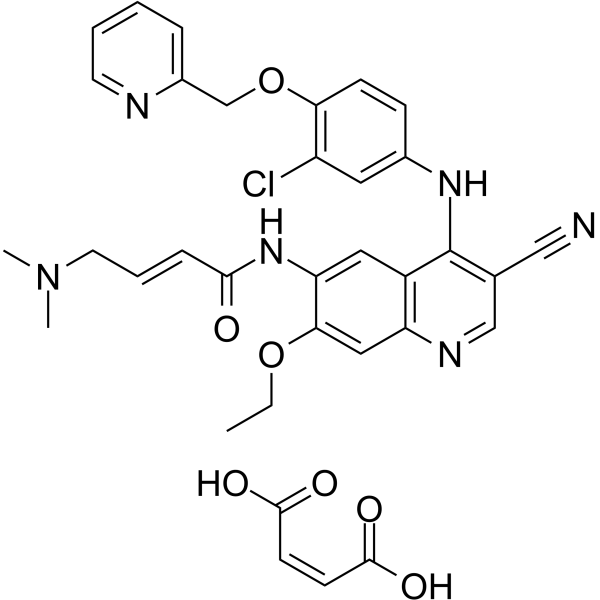915942-22-2
| Name | Neratinib Maleate |
|---|---|
| Synonyms |
2-Butenamide, N-[4-[[3-chloro-4-(2-pyridinylmethoxy)phenyl]amino]-3-cyano-7-ethoxy-6-quinolinyl]-4-(dimethylamino)-, (2E)-, (2Z)-2-butenedioate (1:1)
(2E)-N-(4-{[3-Chloro-4-(2-pyridinylmethoxy)phenyl]amino}-3-cyano-7-ethoxy-6-quinolinyl)-4-(dimethylamino)-2-butenamide (2Z)-2-butenedioate (1:1) |
| Description | Neratinib (HKI-272) maleate is an orally available, irreversible, highly selective HER2 and EGFR inhibitor with IC50s of 59 nM and 92 nM, respectively[1]. |
|---|---|
| Related Catalog | |
| Target |
HER2:59 nM (IC50) EGFR:92 nM (IC50) |
| In Vitro | Neratinib displays no activity against other serine-threonine kinases such as Akt, cyclin D1/cdk4, cyclin E/cdk2, cyclin B1/cdk1, IKK-2, MK-2, PDK1, c-Raf, and Tpl-2, as well as the tyrosine kinase c-Met[1]. Neratinib (0.5 ng/mL–5 μg/mL, 2 days) inhibits the proliferation of cell lines that show high levels of HER-2 (3T3/neu, SK-Br-3, and BT474) and is much less active in cell lines that express neither HER-2 nor EGFR (3T3, MDA-MB-435, and SW620) [1]. Neratinib (0-2 nM, 12-16 h) arrests BT474 cell cycle at G1-S phase[1]. Neratinib results in the inhibition of MAPK and Akt phosphorylation, down-regulation of cyclin D1 levels, and induction of p27[1]. Cell Proliferation Assay[1] Cell Line: 3T3, 3T3/neu, SK-Br-3, BT 474, A431, MDA-MB-435 and SW620 Concentration: 0.5 ng/mL–5 μg/mL Incubation Time: 2 days (6 days for BT474) Result: Inhibited cell proliferation with IC50 values of 700 ± 78, 3 ± 0.14, 2 ± 0.18, 2 ± 0.06, 81± 9, 960 ± 165 and 690 ± 84 nM against 3T3, 3T3/neu, SK-Br-3, BT 474, A431, MDA-MB-435 and SW620 cells, respectively. Western Blot Analysis[1] Cell Line: BT474 or A431 cells Concentration: 0, 2, 10, 50, 100 and 200 nM Incubation Time: 3 h Result: Decreased ligand-independent receptor phosphorylation by 50% (IC50) at 5 nM in BT474 cells, repressed EGF-dependent phosphorylation of EGFR in A431 cells at a comparable dose (IC50 = 3 nM). Effectively repressed phosphorylation of MAPK and Akt in BT474 cells. Cell Cycle Analysis[1] Cell Line: BT474 Concentration: 0–2 nM Incubation Time: 12–16 h Result: Blocked cell cycle progression, causing a G1-S arrest, a 50% decrease in the number of cells in the S (DNA synthesis) phase of the cell cycle was observed at a concentration of 2 nM. |
| In Vivo | Neratinib (HKI-272) (0-80 mg/kg/day; i.g.; 42 days) shows anticancer activities against cancer cells that expresses high levels of HER-2 or EGFR[1]. Animal Model: Female athymic (nude) mice, tumor xenograft[1] Dosage: 10, 20, 40, 60 or 80 mg/kg/day Administration: Gavage, 42 days Result: Reduced tumor growth in a dose-dependent manner in 3T3/neu, BT474, SK-OV-3 and A431 xenografts, but was o inactive in xenografts of MX-1 and MCF-7. Inhibited phosphorylation of HER-2 in BT474 xenografts. |
| References |
| Molecular Formula | C34H33ClN6O7 |
|---|---|
| Molecular Weight | 673.115 |
| Exact Mass | 672.209900 |
